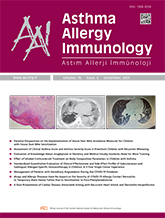


Objective: The aim of this study was to determine the clinical course and treatment outcomes of patients with hereditary angioedema (HAE) after infection with coronavirus disease 2019 (COVID-19).
Materials and Methods: Thirty-nine patients with HAE were included in this study. These patients were regularly followed up over phone calls since the first COVID-19 case was seen in our country. Patients were asked to visit the hospital if there was a history of contact with a confirmed COVID-19 patient or if the patient developed clinical symptoms of COVID-19.
Results: There were 21 (54%) patients with type I HAE, and 18 (46%) with type II HAE. All patients received treatment for angioedema attacks (C1-inhibitor [C1-INH], icatibant), and seven (20%) received long-term prophylaxis (danazol). Treatment for attacks was continued for all patients during the pandemic. Patients taking danazol were switched to long-term prophylaxis using the C1-INH concentrate. Eleven (28%) patients with HAE developed COVID-19 during this study. Only one patient had severe COVID-19. Six patients (54.5%) were diagnosed with type II HAE, and five (45.5%) were diagnosed with type I HAE. The most common COVID-19 symptoms were fever (7/11; 64%) and myalgia (6/11; 55%). Mild angioedema attacks were experienced by 36% (4/11) of the HAE patients diagnosed with COVID-19. Icatibant was used in all patients.
Conclusion: Agents used for HAE block the kallikrein-kinin system and may be useful in the treatment of COVID-19. Considering their beneficial effects on COVID-19, it is recommended that HAE patients should continue the use of agents blocking the kallikrein-kinin system.